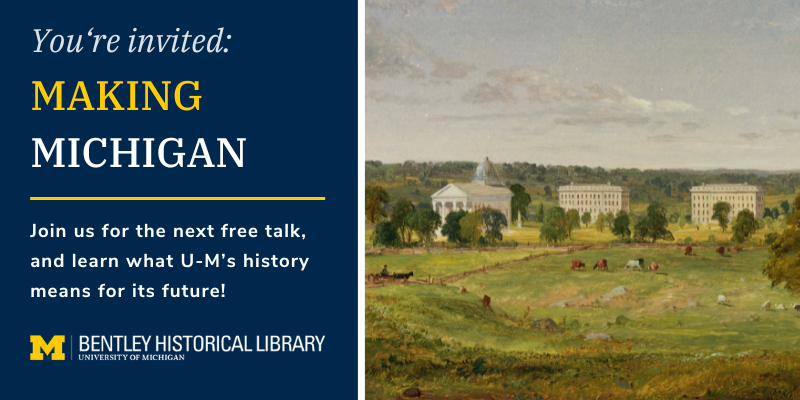Join us for the Bentley Historical Library’s series of talks exploring the history of the University of Michigan.

Making Michigan will return in September 2025.
Until then, please enjoy one of the previous lectures below.

Unboxing the Unexpected: The Notable and the Infamous in U-M’s archives
The 1817 Project: U-M’s Origins, Indigenous Lands, and Institutional (In)Action
History, Power, and the Stories We Tell: Making Race, Space, and Memory at Michigan
Giving It All Away: The Story of William W. Cook and His Michigan Law Quadrangle
Quotas and the President: Jewish Inclusion and Exclusion at U-M in the 1920s
Not Just a Copy: How the Bentley Digitized Ann Arbor History in the Ivory Photo Collection
Myths and Mysteries of the Little Brown Jug: The History of College Athletics
Secret Histories: Uncovering the Hidden Truths of U-M’s Past
Making Big History: Adding Billions of Years to Students’ Education
How U-M’s First Hospital Made History – with Joel Howell
Four Years of “Making Michigan” and Four Decades at Michigan: Some Reflections – with Gary Krenz
A Stunning Achievement: The Improbable Collaboration of the Bentley Library and the Vatican Archives
More Than “First Do No Harm”: Modeling Global Engagement with the U-M/Ghana Partnership
A City’s Conscience: The Life and Career of Josephine Gomon
Wolverine Writers II: Stories of Fire, Ice, and Rebirth
Poets at Michigan: Then and Now
A Library for All: U-M, Google, and the Importance of Having a Copy
Keeping Resistance Alive: Chandler Davis and Academic Freedom at U-M
Fifty Years of Native American Student Activism with Bethany Hughes
To Put Living Force Into the Symbols: The Journeys of Anatol Rapaport
Wolverine Writers: History and Storytelling Across Campus and through the Years
Seeing Anew Symposium 1: The Observatory and 19th-Century Science and Scholarship
Seeing Anew Symposium 2: The Observatory in the History of Astronomy
Seeing Anew Symposium 3: The Observatory as an Historic Site for Contemporary Education
Seeing Anew Keynote: Astrophysicist Brian Nord in conversation with Gary Krenz
The McCarthy-Era Red Scare in Michigan: Its Meaning, Then and Now with David Maraniss
Sing to the Colors: My Complicated Love Song to the University with James Tobin
Undermining Racial Justice at the University of Michigan with Matthew Johnson
Anti-Fascism at U-M: Defending Democracy During the Spanish Civil War with Juli Highfill
Radical Roots, Contested Place: African American and African Studies at U-M with Stephen Ward
Stars Rising: Why U-M’s Detroit Observatory Matters — and Where It’s Going with Gary Krenz
Telling the Truth About the Liberal Arts: Histories and Futures with Terry McDonald
